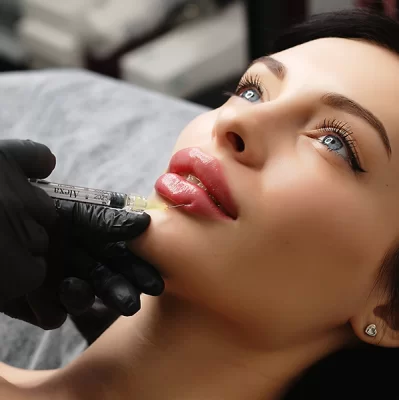Is hyaluronic acid safe?
- Is hyaluronic acid safe?
- Why is hyaluronic acid considered harmless?
- What are the contraindications for using hyaluronic acid?
- Why are hyaluronic acid treatments not recommended for pregnant and breastfeeding women?
- Can hyaluronic acid cause allergic reactions?
- What are the most common side effects of hyaluronic acid?
- What complications can occur after using hyaluronic acid?
- What are the risks associated with hyaluronic acid injections?
- How does the quality of the product affect the safety of the procedure?
- How does a doctor's experience affect the safety of a procedure?
Hyaluronic acid is considered safe due to its natural presence in the human body and moisturizing properties. Clinical studies confirm its effectiveness and low risk of serious side effects from its use. Most available products containing hyaluronic acid have undergone rigorous testing, which increases the safety of their use. As a result, hyaluronic acid has gained popularity in aesthetic medicine as a versatile substance improving skin condition.
Hyaluronic acid is considered safe because it is a natural component of the human body. This significantly reduces the likelihood of adverse reactions to this substance. Due to its ability to bind water, hyaluronic acid improves skin hydration and supports its regeneration. Clinical studies show that most people tolerate it well. Its natural origin allows the body to recognize it, minimizing the risk of allergies. For this reason, it is widely used in aesthetic medicine, for example, for filling wrinkles and lip augmentation.
Using hyaluronic acid may be contraindicated in the following cases:
- pregnancy and breastfeeding,
- allergy to hyaluronic acid,
- presence of an active infection at the site of planned treatment,
- cancer and breast cysts,
- autoimmune diseases such as hyperthyroidism or hypothyroidism,
- diabetes and blood clotting issues,
- tendency to form keloids.
Exercising caution when using hyaluronic acid helps minimize the risk of complications and achieve better aesthetic results.
Treatments using hyaluronic acid are not recommended for pregnant and breastfeeding women due to insufficient data on their safety in these groups. There is concern that substances used during such procedures may have a negative impact on fetal development or pass into breast milk, potentially harming the child. Even in the absence of direct evidence of harm, it is recommended to avoid hyaluronic acid during this period.
Hyaluronic acid rarely causes allergies. However, it may trigger swelling, redness, or itching at the application site. Therefore, it is important to inform the doctor about any allergic issues before the procedure. This helps reduce the risk of adverse reactions and ensures greater safety during the procedure.
The most common side effects of using hyaluronic acid are:
- swelling,
- redness,
- pain,
- bruising at the injection site.
Usually, these symptoms disappear after a few days. After the procedure, the skin may be temporarily hard or red, but these are usually mild and short-lived reactions. It is important to be aware of these natural effects of injections. Choosing an experienced specialist and exercising caution after the procedure can significantly reduce the risk of complications.
In some cases, more serious complications may occur after the use of hyaluronic acid. There is a risk of infections that may require medical intervention. Additionally, granulomas, which are inflammatory areas in the tissue, can form. Allergic reactions, characterized by swelling or redness, may also occur rarely.
Adhering to safety standards and seeking services from experienced doctors significantly reduce the risk of experiencing adverse side effects associated with procedures using hyaluronic acid.
Hyaluronic acid injections may be associated with certain risks, especially in areas with a rich network of blood vessels, such as the nose or the area between the eyebrows. In these regions, there is a possibility of vessel closure, which can lead to more serious complications. Although allergies are rare, they can result in swelling or redness at the injection site.
Adhering to safety standards and selecting appropriate products are crucial to minimize the risks associated with hyaluronic acid injections. When opting for such a procedure, it is important to pay attention to the quality of the products used and the skills of the person performing the injection.
The quality of the hyaluronic acid used is of great importance for the safe conduct of the procedure. Products of high quality standards, which are thoroughly purified and stabilized, help reduce the risk of adverse reactions. Renowned manufacturers provide certified medical preparations, distinguished by their safety and effectiveness. By choosing such a product, a doctor can be sure that it has undergone rigorous clinical testing. Therefore, it is crucial to adhere to safety principles by selecting proven products to minimize the risks associated with the use of hyaluronic acid.
Equally important is the experience of the doctor. An experienced specialist performs the procedure with precision and can adequately respond to any complications. The doctor's skills are crucial for achieving excellent aesthetic results. Therefore, it is worth trusting experts with the appropriate qualifications and extensive experience in working with hyaluronic acid.
Experience of a specialist in aesthetic medicine plays a key role in safely performing procedures using hyaluronic acid. Qualified doctors can adjust injection techniques to specific areas and individual patient needs, increasing the precision of the procedure. Careful administration of the product into the proper skin layers minimizes the risk of complications.
The specialist must be able to assess the skin condition of a person and anticipate possible complications. This helps avoid errors that could lead to health problems. Additionally, experienced doctors are better prepared to act quickly in unforeseen circumstances during the procedure. Therefore, it is worth using the services of experts with the appropriate qualifications and experience in working with hyaluronic acid, which directly translates into the safety and effectiveness of aesthetic procedures.
